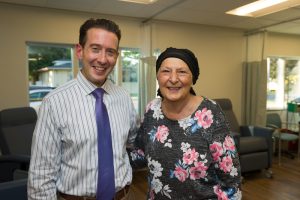
Early Signs of Inflammatory Breast Cancer
Regional Cancer Care Associates (RCCA) provides comprehensive treatment of cancer and blood disorders to patients throughout New Jersey, Connecticut, Maryland, and the Washington, DC, area.
HIPAA Alert: Potential Data Breach Learn More
Questions on Oncology, Hematology and/or Infusion Clinical Services due to COVID-19 Crisis – CALL 833-698-1623
Important Information for Our Patients Regarding the Coronavirus.
RCCA Providing Area Cancer Patients with Access to Care During Coronavirus Outbreak
RCCA Offering Patients Virtual Visits During Coronavirus Pandemic
Breast cancer survivors often get tattoos to celebrate their recent victory over their disease. They may choose one or more artistic tattoos and, if they’ve undergone a mastectomy, can elect to receive tattoos that have the realistic look of nipples.
Tattoos, however, can cause health complications for breast cancer survivors, many of whom are still recovering from the effects of treatment or the disease itself. Before you make that artistic statement on your body, take a closer look at the tattoo-related risks with this guide from Regional Cancer Care Associates.
Why do so many breast cancer survivors want a tattoo?
First, many women feel empowered by the tattoos they receive following their cancer treatment. Tattoos can give women a sense of control over their bodies by masking mastectomy scars or mimicking the look of nipples. Women might also get tattoos to commemorate their breast cancer journey.
Are Tattoos Safe for Breast Cancer Survivors?
Ultimately, a breast cancer survivor’s decision to get a tattoo is one of personal significance and is best left to the survivor.
Before you take the plunge, however, consider the risks tattoos can pose to breast cancer survivors. While tattoos pose general health and safety risks to all who get them, breast cancer survivors may be at a slightly higher risk than the general population.
Infection is the most prevalent risk associated with tattoos. Because tattoo inking involves continuous skin puncturing and ink injection, unsanitary equipment can cause prolonged redness and swelling paired with a fever. If you experience any of these symptoms after your tattoo appointment, contact your doctor immediately.
For breast cancer survivors who have undergone radiation treatments, the risk of infection is slightly higher because their skin is more fragile. For this reason, doctors recommend waiting between 3 and 5 months after breast surgery before getting a tattoo. They also suggest that you consult your doctor before you get a tattoo to be sure that your incisions and any radiation-related dermatitis are fully healed.
Another tip: Scope out different parlors and examine their facilities and practices before committing to that final tattoo appointment. Be sure to ask the artist about licensing and the sanitation, health, and safety protocols followed in the shop. Don’t hesitate to check reviews online and ask for samples of their work. You can also inquire about their experience in working with breast cancer survivors and ask if a private area will be available for your comfort. You should feel comfortable with your tattoo artist and confident in both his/her artistic talents and ability to support your needs.
Finally, evidence from multiple studies suggests that tattoos do not pose major health problems, increased risk of cancer or recurrence, or interference with breast cancer screening. One 2017 study found that certain metals in tattoo ink can accumulate in our lymph nodes and, as a result, make us more susceptible to certain diseases. Although these findings were ultimately deemed inconclusive, they underscore the importance of doing your research before you ink, especially if your body is still recovering from breast cancer.
Our Breast Cancer Care
The Regional Cancer Care Associates team hopes this guide will help you reach a sound decision about whether you, as a breast cancer survivor, should get a tattoo. If you still have questions about tattoos, stop by one of our locations to speak with a member of our staff today to help you reach a conclusion with confidence.
At our more than 30 clinics throughout Connecticut, Maryland, and New Jersey, we provide quality breast cancer care that is backed by our wealth of medical experience. We tailor our treatments to each patient, and these treatments may include surgery, chemotherapy, radiation therapy, immunotherapy, and other state-of-the-art procedures.
For more information or to schedule an appointment,
call 844-346-7222. You can also schedule an appointment by calling the RCCA location nearest you.

Regional Cancer Care Associates (RCCA) provides comprehensive treatment of cancer and blood disorders to patients throughout New Jersey, Connecticut, Maryland, and the Washington, DC, area.

When people think of breast cancer, they generally think of it affecting women. However, in rare circumstances, breast cancer can affect men, most commonly in

First diagnosed with breast cancer in 1992, she has persevered in her battle against the disease for more than 30 years.

Regional Cancer Care Associates is one of fewer than 200 medical practices in the country selected to participate in the Oncology Care Model (OCM); a recent Medicare initiative aimed at improving care coordination and access to and quality of care for Medicare beneficiaries undergoing chemotherapy treatment.